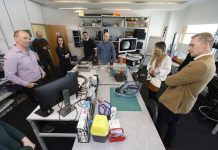E.ON and the Cardiff office of global real estate advisers Savills have come together to run an innovative behavioural science experiment, to test how businesses can encourage their employees to do their bit and reduce their energy use. These small and unobtrusive changes had little or no impact on day-to-day business activities but saw energy use fall by an impressive 26%.
The four-week experiment run in the city centre office revolved around Savills employees, comparing the behaviour of two sides of the office: one with a series of behavioural science inspired ‘nudges’ to prompt responsible energy behaviours, with the other running as a control group without any interventions, to monitor energy use over the same period.
Nudges are small interventions designed to prompt people into a different pattern of behaviour, such as switching a light off that they may have left on. These make use of behaviour change techniques to guide employees into more sustainable choices – for example habit formation and creating social norms where individuals change their behaviour to fit in with the group.
Given that Savills office already has its own building management system in place with energy efficiency measures such as pre-set timers for lighting which could not be controlled by staff, the experiment offered an opportunity to explore other ways that a business can save energy and the important contribution individual employees can play.
Anna Kuzniar, Associate Director at Savills Energy, said: “The results at the end of the four weeks show we can all do more to save energy. We’ll use the results to support our own sustainability targets, and to inform our advice to clients. With energy prices at an all-time high we know that reducing consumption can make a real difference to a company’s bottom line, as well as to its carbon footprint.”
Phil Gilbert, Director of Customer Solutions at E.ON, added: “Large scale technologies and smart systems often get all the attention when it comes to businesses making the most of their energy needs, but, from an efficiency perspective, it’s often the case that the first step is making sure you’ve eliminated waste and you are operating efficiently. That’s why we’re really excited to have come together with a forward-thinking organisation like Savills on this experiment and show there are improvements that can still be made, even in a modern and well-managed office.
“These fantastic results prove that behavioural science is a powerful tool, with small changes able to make a big impact on office running costs. I look forward to helping more of our customers use these learnings to save energy and money.”




















